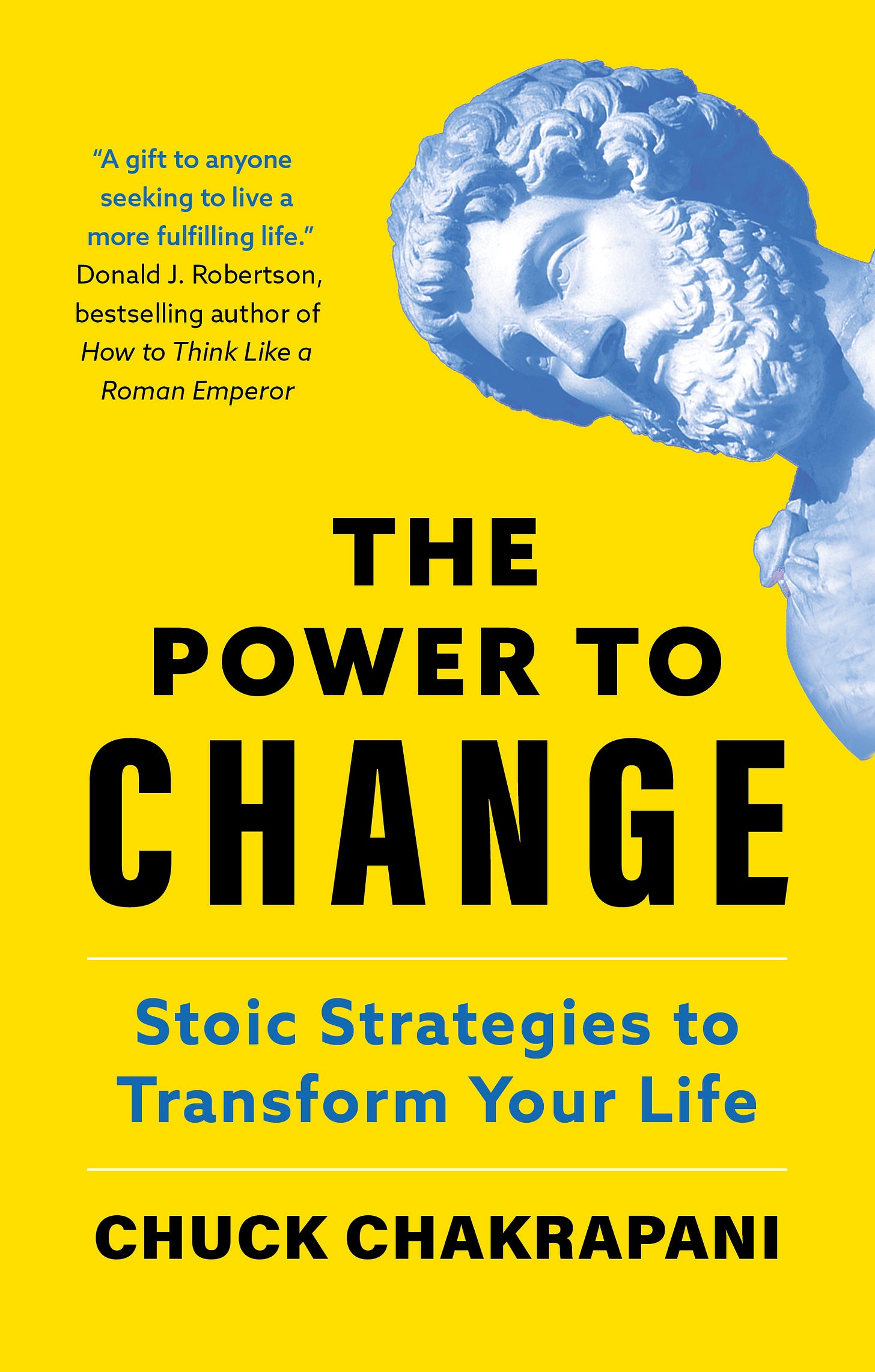Stoic Strategies for a Better Life: How Ancient Philosophy Outperforms Modern Self-Help
An interview with Dr.Chuck Chakrapani
Dr. Chuck Chakrapani is a leading voice in modern Stoicism, blending ancient philosophy with practical wisdom for today’s world. He is the founder of The Stoic Gym and editor of THE STOIC, a monthly digital magazine dedicated to Stoic thought. A prolific author, he has written over 15 books on Stoic philosophy, including Unshakable Freedom (2016), The Good Life Handbook (2016), and How to Be a Stoic When You Don’t Know How (2020). His latest book, The Power to Change: Stoic Strategies to Transform Your Life, is set for release in June 2025.
How did you first become interested in ancient Philosophy?
Zeno founded Stoicism after getting caught in a storm; I found Stoicism after getting caught in the rain.
I was still in my teens, and it was a rainy day. To shelter myself, I walked into a nearby library, pulled a book at random, and began reading. It happened to be Meditations, by Marcus Aurelius. When I reached the second chapter and read the passage: “Today I will meet people who are interfering, ungrateful, arrogant, disloyal, jealous, and selfish. They are like this because they don’t know what is good and what is evil. But I have seen the beauty of good and the ugliness of evil... So, none of them can hurt me. No one can link me to what is ugly,” I was hooked. For the first time, it occurred to me that I could choose my own response to whatever happens. I didn’t have to react in predictable ways or in ways others expected of me. It was powerful and liberating.
Later, I came across Epictetus’s Enchiridion. The very first line struck me: “Some things are up to us and others are not…” For me, this was a BFO - a blinding flash of the obvious.
These two insights - that you control your responses to things, and that it is really silly to worry about things you can do nothing about - were so powerful as to set me on the Stoic path.
Tell us about The Power to Change: Stoic Strategies to Transform Your Life.
The Power to Change is a book of Stoic self-guidance. It addresses everyday problems we all encounter such as overthinking, worrying, getting caught up in internal dialogues, and the clutter that accumulates in our minds. It also deals with issues like perfectionism, the turmoil in the world, anger, anxiety, and similar challenges. While the Stoics did not explicitly tackle every modern problem, their philosophy offers a framework for addressing such issues. However, finding solutions in Stoicism is not always straightforward: first, you have to identify the problem, then search Stoic teachings for relevant answers.
In this book, I have tried to tackle some of the common problems people face these days and explored Stoic literature to find practical solutions. Even if you are not a Stoic and have no intention of becoming one, the solutions presented here can still benefit you.
Each problem is examined individually, followed by a discussion of solutions based on Stoic ideas. The chapters are short, the language is straightforward, and the solutions are accessible. Each chapter concludes with a summary of key points and a simple exercise to reinforce what you have learned.
My aim in this book is to help readers create “a life that flows well,” helping them to soar like an eagle rather than move like a car navigating speed bumps and potholes.
How do you feel ancient philosophy differs from mainstream self-help approaches, and why do you believe it’s more effective for lasting change?
Modern self-help books cover a wide spectrum. Some are grounded in psychological and behavioral research; others blend scientific findings with inspirational writing. Many are based on the authors’ personal theories or even outlandish ideas. Some of these books are excellent, while others can be misleading or even harmful. To be fair, the same can be said of philosophical writings as well. There are modern Stoic writings that unfortunately, suggest that violence, sexism, or the pursuit of wealth for its own sake are sanctioned by Stoicism.
The philosophical approach is effective for two main reasons. First, it offers a consistent framework from which you can derive solutions to your problems. Second, because these philosophical solutions have existed for a long time, they have been tested in real life and have stood the test of time. This is evident in the way these solutions have been explicitly or implicitly incorporated into modern psychotherapies such as REBT, CBT, and the so-called “third generation” therapies.
Through my explorations of philosophy, I realized that simply knowing where you want to go is not enough.
Many academic philosophers spend their time parsing concepts and quibbling over meanings rather than addressing the concepts themselves. They may disagree, but I have always felt like Epicurus, who said,
Empty is the word of that philosopher by whom no affliction of human beings is cured. For as there is no benefit in medicine if it does not treat the diseases of the body, so with philosophy, if it does not drive out the affliction of the soul.
It was not any single pivotal moment, but rather my ongoing concern with the human condition that led me to interpret and apply Stoic principles to real-life predicaments. Through my explorations of philosophy, I realized that simply knowing where you want to go is not enough. Alcoholics know they should be sober. Drug addicts know they need to be clean. But they don’t know how to get there. Knowledge must be translated into action, and that’s where my book comes in. It is practical and actionable.
The book tackles procrastination, self-sabotage, and motivational plateaus. What’s one counterintuitive Stoic tactic for pushing through resistance when willpower feels depleted?
This is an interesting question. I’m sure there are counterintuitive insights in Stoicism. But for me, what stood out more were the moments when I thought to myself, “Of course this is true. Why haven’t I used it in my life?” rather than, “Is that so? Let me check it out.” For example, consider the first two insights I mentioned at the beginning: how we react to anything is our choice, and there is no point in worrying about something if you cannot do anything about it. These are not counterintuitive or controversial; almost anyone would agree with them. Yet, how many of us have truly applied these insights in our own lives? Wouldn’t our lives be radically transformed if we consistently put them into practice? I see most Stoic ideas as intuitive and obvious rather than counterintuitive and revelatory. To me, Stoic path is more about waking up from our sleepwalk and see the obvious rather than about finding solutions we have never thought of before.
I suspect Zeno would have appealed as much to the bystanders as to the prokoptons on the painted porch in the ancient agora.
Zeno does not attempt to define happiness directly, yet in a way, he provides the most useful definition of all.
Do you have a favorite quote that you use?
There are many quotes that could be called favorites, and they tend to change over time. I’m sure I don’t even remember what my favorite Stoic quote was last year. But for now, my favorite is Zeno’s
Happiness is a life that flows well.
(Stobaeus ii.7)
This quote does not define happiness in terms of possessions, status, wealth, spiritual advancement, or even virtue. Instead, it offers a criterion by which you can judge for yourself whether something is good.
Take the four vices, for example: Is foolishness good? Is excess good? Is cowardice good? Is injustice good? Consider each one and ask yourself if it would help your life flow well. If not, then it is not good. Similarly, does trying to control things that are not under your control help your life flow well? If not, then it is not good. This also tells you that you cannot consider yourself happy if your life is not flowing well, no matter how much money, power, or possessions you have. As I mentioned earlier, my book The Power to Change is about creating a life that flows well.
Zeno does not attempt to define happiness directly, yet in a way, he provides the most useful definition of all.
What advice would you give someone who wanted to learn more about what you do?
If you are interested in my approach to Stoicism, you may want to subscribe to The Stoic Gym’s monthly magazine, THE STOIC, and also receive my weekly blogs: thestoicgym@substack.com or thestoicgym.com. The price is right – it’s free.
What question would you like to leave us to think about?
When you read the Stoics, you get the sense that they faced exactly the same problems we face today, and their solutions are just as applicable now as they were two thousand years ago. Why, then, do we expect the world to be any different in another two millennia? Is human nature fixed? Can we ever change the world except outwardly? Or is the idea of living a life that flows well something that applies only to individuals, not to society as a whole? Is the notion of making the world a better place (beyond outward changes) merely an illusion born of our hubris?
Dr. Chuck Chakrapani’s career has spanned the highest levels of business leadership, serving as CEO of Millward Brown Canada and President of Leger Analytics and advising Fortune 500 companies, governments, and nonprofits across various industries. Simultaneously, he has pursued a distinguished academic career, holding appointments at institutions like the London Business School and currently serving as Distinguished Visiting Professor at the Ted Rogers School of Management, Toronto Metropolitan University. More recently, he has turned his attention Stoicism, offering a modern and practical lens through which to explore its enduring wisdom. Beginning with Unshakable Freedom and the monthly digital magazine THE STOIC, he has authored a growing library of books on the subject. Explore Dr. Chakrapani’s work on Stoicism at: https://thestoicgym.substack.com.









Great interview. I really appreciate and admire Dr. Chakrapani's words of wisdom. I wish a similar rainy day and library would have found me in my teens! :-)
What an inspiring interview---a wonderful example that we all have "The Power to Change". It is up to us and our way of thinking. I've ordered two copies, one for each eye.